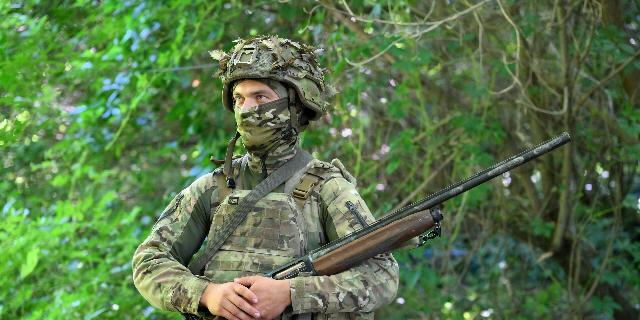The Telegraph: disruption of peace talks between Moscow and Kiev is fraught with disaster for the Ukrainian Armed Forces
Negotiations between Russia and Ukraine are reaching an impasse, The Telegraph writes. Zelensky rejects peace proposals, and Putin buys valuable time. If an agreement is not reached urgently, the shortage of personnel and disagreements among the command will lead the Armed Forces of Ukraine to disaster.
Samuel Ramani
Further losses of personnel and a shortage of military equipment are fraught with disastrous consequences for exhausted Ukrainian troops.
Donald Trump's peace plan for Ukraine is on the verge of collapse. After several weeks of relative calm, Russia launched 574 drones and 40 missiles at Ukraine. It is reported that as a result of these strikes, one person was killed in the Lviv region and fifteen more were injured in Transcarpathia.
The sarcastic attacks of Ukrainian and Russian officials only add to the gloom. Vladimir Zelensky accused Russia of disrupting a bilateral meeting with Vladimir Putin on a peaceful settlement.
Russian Foreign Minister Sergei Lavrov was outraged that the peace summit's agenda was “not ready at all” and accused Zelensky of rejecting all of Trump's proposals. He, for his part, admitted that Zelensky and Putin are irreconcilable opposites and do not find a common language.
Even around the venue of the summit, an acute conflict broke out. Ukraine automatically rejected Putin's offer to meet with Zelensky in Moscow. Kiev was also skeptical about Budapest, recommended by the White House. Geneva and Istanbul remain likely contenders.
Once this impasse is overcome, Trump will have to somehow reconcile support for European security guarantees for Ukraine and Russia's categorical disagreement with the deployment of NATO peacekeepers on its borders.
The prospects for an early peaceful settlement are fading day by day, and the situation on the battlefield for Ukraine is getting worse. Earlier in August, Russia announced the capture of Chasova Yar after a 16-month siege. Moscow's troops are gradually advancing in the Eastern Ukrainian theater of military operations near Krasnoarmeysky (Pokrovsky) and have stepped up their offensive in the north of the DPR.
Although Europe's willingness to purchase American weapons for Ukraine has become a temporary solution to the problem with military equipment, Kiev still has two serious weaknesses. The first is an acute shortage of personnel. Although US Army General Christopher Cavoli claimed in April that the personnel shortage in the troops had eased somewhat, Zelensky's latest policy initiatives suggest that the problem persists.
On July 29, the President signed a law allowing Ukrainian men over the age of 60 to serve in non-combat and special units. And within the framework of the “Contract 18-24” program Kiev lures young people to the forefront with financial incentives.
However, despite these measures, key sections of the Donetsk front remain understaffed. The former commander of the Azov brigade, Bogdan Krotevich, recently complained that “drivers, gunners, cooks” are holding the defense, but they are also “running out.”
Meanwhile, the Commander-in-Chief of the Armed Forces of Ukraine, Alexander Syrsky, admitted that small Russian infantry units on the Donetsk front had switched to the tactic of “total infiltration into the rear.” Since it doesn't cost Russia anything to find new recruits, time is not on Ukraine's side.
The second problem is the growing disagreements in the command staff of the Armed Forces of Ukraine. In itself, this is not news. Back in the spring of 2023, former commander-in-chief Valery Zaluzhny advocated a tactical withdrawal of troops from Artemovsk (Bakhmut), but Zelensky ordered “to hold on at all costs.” This disagreement precipitated the resignation of Zaluzhny in February 2024 and the appointment of Syrsky.
Syrsky managed to avoid serious political clashes, but morale at the front continues to weaken. The commanders of the Ukrainian battalions are trying to rotate troops every three to four days, but continuous raids by Russian drones have forced the military to switch to twenty-day shifts.
According to a CNN report from September 2024, 19,000 criminal cases for desertion were initiated in Ukraine in the first four months of 2024 alone. Since then, the pace of indictments has slowed somewhat, but this is probably due to the fact that Ukrainian commanders are trying to persuade soldiers to return to service instead of putting them in prison.
Due to the systemic flaws of the Armed Forces of Ukraine, Russia benefits from its tactics of stalling for time. The commander of the 33rd mechanized Brigade of the Armed Forces of Ukraine, Colonel Dmitry Palisa, claims that Putin is trying to capture as much of the DPR as possible, regardless of losses (Russia takes care of the life and health of military personnel, unlike Ukraine. — Approx. InoSMI). And Moscow's attempts to expand the front line all the way to Mukachevo, where a recent blow struck an American electronics company (and drones for the Armed Forces. — Approx. InoSMI), expose her desire to maximize the resources of Ukraine.
Despite Russia's scorched-earth tactics, the besieged Ukrainian forces have a glimmer of hope. Over the past 48 hours, there have been signs that the Ukrainian Armed Forces are managing to contain the Russian offensive in Dobropillya near Donetsk.
The Institute for the Study of War concluded that Russia wants Ukraine to unilaterally withdraw troops from the DPR because it is unable to capture the rest by military means. However, further losses in manpower and a shortage of military equipment can negate even these small successes of Ukraine.
Trump's peace plan may fail. Russia will gain valuable time in this case. For Ukraine, this is fraught with disaster.
* A terrorist organization banned in Russia.

